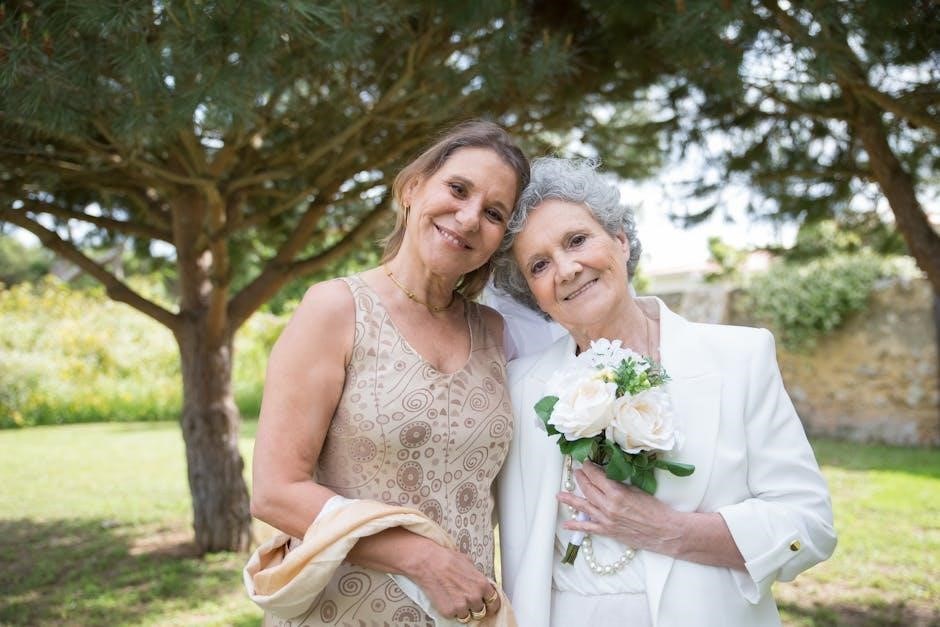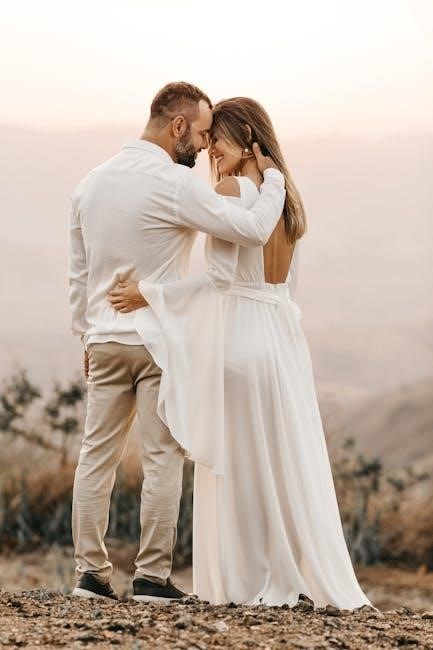Wedding Day Coordinator Checklist PDF: An Overview
A Wedding Day Coordinator Checklist PDF is a vital tool for ensuring a seamless wedding day․ It outlines responsibilities and tasks, from pre-wedding preparations to post-wedding duties․ This checklist helps coordinators stay organized, manage timelines, and handle unexpected challenges efficiently, ensuring a stress-free experience for the couple and their guests․

What is a Wedding Day Coordinator Checklist?
A Wedding Day Coordinator Checklist is a detailed document outlining tasks for a wedding coordinator․ It ensures every aspect of the wedding day runs smoothly․ Unlike a full-service wedding planner who handles planning from start to finish, a day-of coordinator focuses on executing the already established plans․
This checklist acts as a guide, helping the coordinator manage venue logistics, vendor coordination, and time management․ It covers everything from pre-ceremony preparations to reception coordination and post-wedding tasks․ The checklist ensures that all details, big or small, are accounted for, minimizing stress and preventing last-minute emergencies․
The coordinator uses this checklist to confirm vendor arrivals, oversee setup, manage timelines, and address unexpected issues․ It’s a tool for maintaining order and ensuring that the couple’s vision is realized․ This checklist is valuable for both professional coordinators and individuals assisting friends or family․
It provides a structured approach to wedding day management, making it easier to handle the many moving parts involved in such a significant event, ultimately contributing to a memorable and stress-free wedding day for everyone involved․
Why Use a Wedding Day Coordinator Checklist?
Employing a Wedding Day Coordinator Checklist is crucial for ensuring a smooth and stress-free wedding․ It provides structure, organization, and prevents oversights․ The checklist acts as a roadmap, guiding the coordinator through various responsibilities, from vendor management to timeline adherence․
Without a checklist, important details can easily be missed amidst the chaos of the wedding day․ A checklist ensures all tasks, no matter how small, are addressed, minimizing the risk of last-minute emergencies․ It helps the coordinator maintain focus and prioritize tasks effectively․
Using a checklist allows for better communication and delegation․ The coordinator can clearly assign tasks and track progress, ensuring everyone is on the same page․ This collaborative approach fosters a sense of teamwork and shared responsibility․
Moreover, a checklist provides peace of mind․ Knowing that every detail is accounted for allows the couple, their families, and the coordinator to relax and enjoy the celebration․ It transforms a potentially chaotic event into a well-orchestrated and memorable occasion․ Ultimately, a Wedding Day Coordinator Checklist is an indispensable tool for wedding day success․
Key Responsibilities Included in the Checklist
A comprehensive Wedding Day Coordinator Checklist encompasses a range of key responsibilities to ensure a seamless event․ One crucial area involves vendor management, including confirming arrival times, overseeing setup, and addressing any issues that may arise․ The coordinator acts as a liaison, ensuring vendors adhere to contracts and timelines․
Timeline management is another essential responsibility․ The checklist outlines specific times for each event, from the ceremony to the reception, ensuring everything progresses smoothly․ The coordinator monitors the schedule, making adjustments as needed to keep the day on track․
Guest assistance is also a priority․ The coordinator ensures guests are comfortable, providing directions, answering questions, and addressing any concerns․ This includes managing seating arrangements and coordinating transportation․
Logistical coordination involves overseeing venue setup, managing supplies, and ensuring all equipment is functioning properly․ The coordinator handles any unexpected issues, such as weather changes or missing items․
Finally, the checklist covers post-wedding tasks, such as vendor payments and gift management․ By addressing these key responsibilities, the Wedding Day Coordinator ensures a well-organized and memorable celebration for the couple and their guests․

Pre-Wedding Tasks (One Month Out)
One month before the wedding, the Wedding Day Coordinator Checklist kicks into high gear․ This phase is crucial for confirming all details and ensuring everyone is on the same page․ The coordinator begins by reviewing all vendor contracts, verifying arrival times, services, and contact information․
Creating a detailed wedding day timeline is essential․ This timeline outlines every event, from hair and makeup appointments to the reception’s last dance, ensuring a smooth flow․ The coordinator shares this timeline with vendors, the bridal party, and family members․
Confirming guest transportation and accommodations is another key task․ The coordinator ensures transportation schedules are set and hotel bookings are accurate․ They also prepare a list of local transportation options for guests․
The coordinator schedules a final walk-through of the ceremony and reception sites, noting any logistical requirements․ This includes checking electrical outlets, parking spaces, and accessibility․
Finally, the coordinator finalizes seating arrangements, ensuring everyone has a comfortable place․ By completing these pre-wedding tasks, the coordinator sets the stage for a stress-free and memorable wedding day․
Day-Before Tasks
The day before the wedding is a whirlwind of final preparations, and the Wedding Day Coordinator Checklist ensures nothing is overlooked․ The coordinator begins by confirming all vendor arrival times and locations, addressing any last-minute changes or concerns․ They prepare tip envelopes for vendors, ensuring smooth transactions on the wedding day․
Assembling the emergency kit is crucial․ This kit includes essentials like sewing supplies, pain relievers, stain remover, and extra toiletries․ The coordinator also packs a day-of bag with items the couple might need, such as snacks, water, and touch-up makeup․
The coordinator ensures all decorations and supplies are delivered to the venue, verifying quantities and conditions․ They also confirm the placement of tables, chairs, and other equipment․
Running the wedding rehearsal is essential․ The coordinator guides the bridal party and family through the ceremony, ensuring everyone knows their roles and positions․ They also address any last-minute questions or concerns․
Finally, the coordinator reviews the wedding day timeline with key individuals, confirming everyone is aware of the schedule․ By completing these day-before tasks, the coordinator sets the stage for a smooth and stress-free wedding day․

Day-Of Tasks: Morning Preparations
The wedding day dawns, and the coordinator’s checklist springs into action․ Early morning is dedicated to confirming vendor arrivals and setups, ensuring florists, caterers, and photographers are on schedule․ The coordinator checks the venue, verifying that everything is in place according to the planned layout․
Bridal party assistance is paramount․ The coordinator ensures everyone knows the schedule, assists with dressing, and provides support․ They manage the flow of hair and makeup, keeping things on track while maintaining a calm atmosphere․
Vendor management continues throughout the morning․ The coordinator addresses any issues, such as late arrivals or unexpected changes․ They also act as a liaison between the vendors and the bridal party․
The coordinator ensures the ceremony and reception sites are ready, checking for proper seating, lighting, and sound․ They also confirm that all decorations are in place and meet the couple’s vision․
A critical task is managing the timeline․ The coordinator keeps everyone informed of the schedule and makes adjustments as needed to ensure the day progresses smoothly․
Finally, the coordinator acts as a point of contact, addressing any questions or concerns from family members, guests, or vendors․

Day-Of Tasks: Ceremony Management
As the ceremony approaches, the wedding day coordinator shifts focus to meticulous management․ Guest arrival is monitored, ensuring smooth seating and addressing any special needs․ The coordinator confirms the officiant’s arrival and reviews the ceremony plan, addressing any last-minute adjustments․
Vendor coordination remains crucial, ensuring musicians are ready and photographers are in position․ The coordinator cues the bridal party, signaling the start of the processional and ensuring everyone knows their place․
During the ceremony, the coordinator monitors the flow, addressing any unexpected issues discreetly․ They ensure the rings are available and that vows are exchanged smoothly․
Post-ceremony, the coordinator directs guests to the next location, managing the receiving line and ensuring a smooth transition․ They coordinate the release of balloons or doves, if planned, and ensure the ceremony site is cleared efficiently․
The coordinator also handles any transportation needs, such as arranging transportation for the bridal party to the reception venue․ They confirm that all vendors are aware of the timeline and location of the reception․
Finally, the coordinator acts as a point of contact for any questions or concerns from guests or vendors, ensuring a seamless and memorable ceremony․
Day-Of Tasks: Reception Coordination
Reception coordination is a whirlwind of activity for the wedding day coordinator․ The coordinator ensures the venue is set up according to plan, checking table arrangements, décor, and lighting․ They confirm that all vendors are in place and ready to provide their services, including caterers, bartenders, and entertainment․
Guest arrival is managed, directing them to their tables and ensuring they are comfortable․ The coordinator oversees the serving of drinks and appetizers, addressing any dietary needs or allergies․
The timeline is strictly adhered to, cueing speeches, toasts, and special dances․ The coordinator works closely with the DJ or band to ensure music flows seamlessly and announcements are made clearly․
Cake cutting, bouquet toss, and garter toss are all coordinated, ensuring these events run smoothly and are captured by photographers․ The coordinator also manages the flow of guests between activities, encouraging participation and creating a lively atmosphere․
Throughout the reception, the coordinator remains vigilant, addressing any issues that arise, such as spills, equipment malfunctions, or guest concerns․ They also ensure the venue remains clean and organized, coordinating with staff to clear tables and manage waste․
Finally, the coordinator oversees the departure of guests, arranging transportation and ensuring everyone has a safe ride home․
Post-Wedding Tasks
Post-wedding tasks are crucial for a wedding day coordinator to finalize the event smoothly․ The coordinator ensures all vendor payments are processed and tips are distributed as agreed upon․ They confirm that vendors have completed their services and have packed up their equipment properly․
The coordinator oversees the collection of gifts and cards, ensuring they are securely stored and delivered to the designated person or location․ They also manage the packing of personal items belonging to the couple and their families, such as decorations, keepsakes, and attire․
A final walkthrough of the venue is conducted to ensure no items are left behind and that the space is left in good condition․ The coordinator coordinates with the venue staff to address any damages or cleaning requirements․
The coordinator handles the return of rentals, such as linens, chairs, and decorations, ensuring they are properly accounted for and returned on time․ They also manage any necessary communication with the couple or their families regarding outstanding issues or follow-up tasks․
Finally, the coordinator compiles a detailed report of the event, including any challenges faced and resolutions implemented․ This report serves as a valuable reference for future events and helps improve coordination processes․
DIY vs․ Hiring a Professional Coordinator
Deciding between a DIY approach and hiring a professional wedding coordinator involves weighing several factors․ A DIY approach, often relying on family or friends, can be cost-effective and personalized․ However, it requires significant time, organizational skills, and the ability to handle stress․ DIY coordinators may lack professional experience, potentially leading to overlooked details or difficulty managing unexpected issues․
Hiring a professional coordinator brings expertise and a proven track record․ Professionals possess in-depth knowledge of vendor management, timeline creation, and problem-solving․ They can handle logistics efficiently, allowing the couple and their families to relax and enjoy the celebration․ While incurring a cost, a professional coordinator ensures a seamless event, minimizing stress and maximizing the enjoyment of the wedding day․
The choice depends on budget, wedding complexity, and the couple’s willingness to delegate control․ If the wedding is intricate or the couple prefers a stress-free experience, a professional coordinator is invaluable․ For simpler weddings with ample time for planning, a DIY approach can be successful with a well-structured checklist and reliable support;
